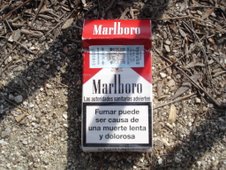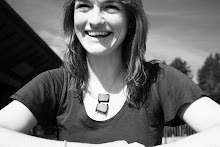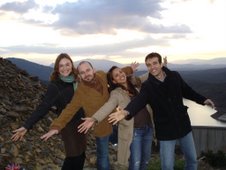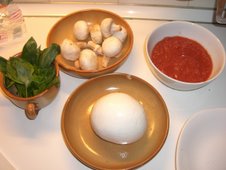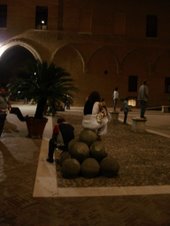The City
I have been thinking lately what a difference there is between life in the city and life outside of it. Ironically, I just had the most positive, non-city-like experience this morning, to counter all the expected negatives that are here like smog and overstimulation and no trees.
I saw the doctor this morning, but I didn't have to go to the doctor's office. It was a real live house call! I woke up yesterday morning with a stiff neck and any wrong move triggered a painful seizing up of all the muscles. (I never believed in the so-called colpo d'aria, a supposedly dangerous phenomenon that happens when you let in a draft, involving stiff muscles, cold, flu, sore throat. It means a "blast of air" more or less, but they act like they were hit by a train when they experience un colpo d'aria. As if a nice cool breeze could have malicious intentions....)
Instant karma for all the heckling I've done to Giovanni for coming from a wimpy culture. I walked around town like Frankenstein yesterday hoping that after a night of rest I'd be ready to run this morning. E invece no! This morning the muscles seized every few minutes and I decided I had to call the doctor because I couldn't figure out how else to deal with this probably minor problem that was unbearable. Dr. Williams is an American doctor, and helps lots of foreign students. What a relief it was to know the the doctor was on his way and I could eat breakfast and stay comfortable while I waited.
After all of this psychologically painful adjusting to "city life", I must say I never expected to experience a real house call by a doctor ever in my life. In fact, it makes me want to stop eating my apple a day so as not to keep the doctor away.
Despite this anomalous experience, I have been adjusting to city life in all of its smoggy, frenetic manifestations, sometimes with difficulty. I realize that every time I go out, I sort of need a wall of defense: sunglasses, a stony stare straight ahead, a keen eye for vomit, feces, urine, or spilled alcohol, and agility to dodge vespas, tiny but speedy cars, and to navigate through elderly women loaded down with groceries, impeccably dressed business types, women in high heels, and cigarettes hanging from every third hand. I am used to space and the smiling courtesy of strangers and feeling clean after a walk downtown. Bologna, in fact, is rather clean. There is not much trash for a place that seems to have been built for people to interact socially in a million ways all day long, and presumably create trash. They say it is cleaned every day (like most cities, I suppose) in the wee hours of the morning.
In fact, it is rather enchanting in terms of social life, and is becoming moreso as the initial feeling of overstimulation from seeing too many faces and hearing too much noise fades. In fact, Bologna has 38 kilometers (about 24 miles) of porticos. These are structures supported by columns that cover the sidewalk and offer shade from the sun, shelter from the rain, and generous sidewalk space for idle chatting, asking for directions, or eating. The map of Bologna looks like a funky bicycle wheel, with one large spoke cutting it in half (via dell'Indipendenza) and many other streets spreading like rays from somewhere in the middle to the outer boundary of the city. The tire, in this analogy, is the series of road that circles the city and actually used to be a wall for protection from the so-called barbarians.
As I venture down the stairs from my fifth story apartment, I go out with the intention of getting lost so that I can find myself by getting oriented again. Every street seems to end up in the center of the city, so with little skill I usually get found as quickly as I get lost.
As part of the intensive language course that I'm taking, I went on an excursion to see the remains of an Etruscan city, complete with an acropolis to worship the gods, a necropolis to bury the dead, and a sewer system. From there, we traveled to a small town between Bologna and Florence called Monte Sole, the site of one of many village massacres by the Nazi and Fascist forces during World War II in an attempt to eliminate partisans without having to figure out who was a partisan. Our guide, Francesco Pirini, who walked us up a paved road through oak trees and blackberry bushes, was a survivor of the massacre, and lost everyone in his family but his sister. We saw the remains of his bombed out church and the cemetery where the occupiers lined all the townspeople up to be killed. His message wasn't surprising but it was clear: Non fare la guerra. Don't make war.
Peace.

